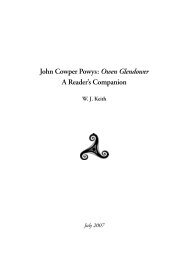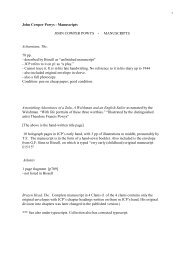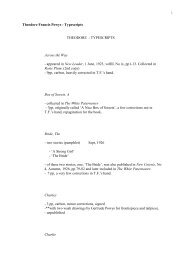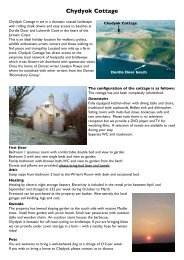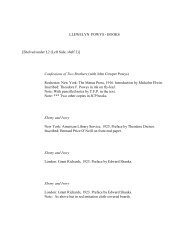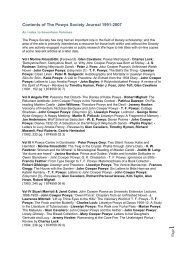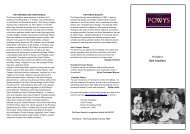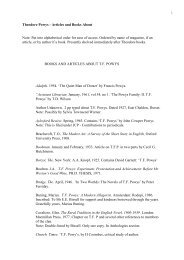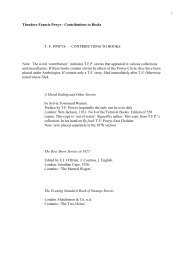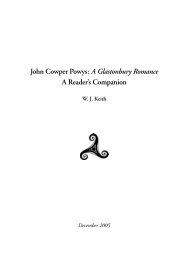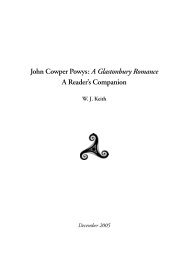J. C. Powys' Autobiography: A Reader's Companion - Site POWYS
J. C. Powys' Autobiography: A Reader's Companion - Site POWYS
J. C. Powys' Autobiography: A Reader's Companion - Site POWYS
You also want an ePaper? Increase the reach of your titles
YUMPU automatically turns print PDFs into web optimized ePapers that Google loves.
34 <strong>Autobiography</strong><br />
King’s (193) — King’s College, Cambridge.<br />
Kipling (301, 305) — Rudyard Kipling (1865–1936),<br />
English poet, fiction-writer, and patriot. JCP<br />
lectured on him at Cambridge in 1902; see<br />
Roberts, “John Cowper Powys and the Cambridge<br />
Summer Meetings” (197). He won the Nobel Prize<br />
for Literature in 1907.<br />
Knight of the Red Cross (324) — The hero of Book<br />
1 of Edmund Spenser’s The Faerie Queene.<br />
Knight Templar (325) — See “Templars.”<br />
Knipe, Mr. (24, 42) — Rev. Thomas Wenham<br />
Knipe, Rector of St. Peter’s, Dorchester, for whom<br />
Charles F. Powys worked as curate.<br />
“know not what they do” (516) — See “They<br />
know not ...”<br />
Koelle, Constantine (176) — A friend of JCP’s at<br />
Cambridge (1862–c.1943), who entered the<br />
Church. For photos, see Dunnet (8–12, 14), who<br />
also provided the details given here.<br />
Kraft-Ebbing (251) — JCP’s attempt at spelling the<br />
name of Richard von Krafft-Ebing (1840–1902),<br />
German neurologist, author of Psychopathia<br />
Sexualis (1886).<br />
Kruger, Mr. (305) — Stephanus Johannes Paulus<br />
Kruger (1825–1904), South African rebel against<br />
British rule at the time of the Boer War.<br />
Ku Klux Klan (577) — The anti-black secret<br />
organization prominent in the southern United<br />
States at this period.<br />
Kubla Khan (514) — Here the reference is to the<br />
poem by S. T. Coleridge.<br />
“Kulaks” (622) — (Russian) Landowners, rich<br />
farmers, victims of revenge after the Russian<br />
Revolution of 1917, liquidated by Stalin.<br />
Kwang-Tze (53, 430, 454, 570, 649) — Kwang-tze or<br />
Chuang-tze was a Chinese follower of Lao-tze<br />
(q.v.) in the third century BC, and the most<br />
important popularizer of Taoism. JCP dedicated<br />
Ducdame to him, introduced him (disguised as a<br />
terra-cotta jar!) in the late fantasy Up and Out<br />
(57), and wrote an article about him in the Dial<br />
LXXV (December 1923), 430–4, reprinted in Powys<br />
Review 7 (Winter 1980), 45–8. Herbert Williams<br />
notes (85–6) that JCP’s interest was probably<br />
fostered by Phyllis Playter, who considered<br />
herself a Taoist.<br />
L<br />
La Motte Foucqué (125) — In fact, Friedrich,<br />
Baron de la Motte Fouqué (1777–1843), German<br />
writer, also author of Undine (1811). The correct<br />
title of his novel mentioned here is Theodolph<br />
the Icelander, also mentioned (and mistitled) in<br />
Wolf Solent (430).<br />
La Rochefoucaud (230, 441) — François, Duc de la<br />
Rochefoucauld (1613–1680), French author best<br />
known for his maxims in Réflexions ou sentences<br />
et maximes morales (1665).<br />
“laborare est orare” (361) — Translated from the<br />
Latin in text, a phrase much stressed by Carlyle in<br />
Past and Present.<br />
Lachesis (570) — ”The Measurer”, one of the<br />
Fates, with Clotho and Atropos.<br />
“lacking in all moral scruple” (200) — JCP also<br />
mentions this charge in a letter in Wilkinson’s<br />
Welsh Ambassadors (148–9). H. P. Collins noted<br />
that “Dr. Gooch has assured me with emphasis<br />
that for his part he never entertained such a<br />
judgement and would certainly never have<br />
voiced it” (21n).<br />
lacrimae rerum (464) — Literally, the tears of<br />
things (Latin). From Vergil’s Aeneid (Book 1,<br />
l.462).<br />
lady we both knew well (429) — Frances Gregg.<br />
See “beautiful girl ...”<br />
laid in the cold ground (225) — Adapted from<br />
Shakespeare’s Hamlet (IV v 69–70).<br />
“laid upon me” (525) — 1 Corinthians 9:16. Also<br />
quoted in In Defence of Sensuality (188).<br />
Lamb, Charles (159, 254, 262, 299, 461, 475, 606) —<br />
English essayist and critic (1775–1834), whose<br />
essays appeared as Essays of Elia and Last Essays.<br />
For his collation of the Beaumont and Fletcher<br />
folio (254), see “Old China” (Last Essays); for the<br />
House of Business (606), see “The South-Sea<br />
House” (Essays); for his “typical Scotchman”<br />
(286), see “Imperfect Sympathies” (Essays). I have<br />
not traced his vision of “the Lake Country<br />
without its mountains” (461). Lamb’s Essay on the<br />
New and Old Schoolmaster (159), in fact “The Old<br />
and the New Schoolmaster,” may be found in<br />
Essays. JCP wrote an essay on Lamb in Visions and<br />
Revisions, and a lecture on him appears in<br />
Singular Figures. See also “Elia’s ‘Dream-<br />
Children’,” and “O city ...”<br />
Lamia (555, 610) — A female demon; often a snake<br />
disguised as a woman, as in Keats’s “Lamia.”<br />
Lancashire Witches, The (125, 143) — A novel by<br />
Harrison Ainsworth (q.v.), published in 1848.<br />
Lancelot Gobbo (411) — A clown in<br />
Shakespeare’s The Merchant of Venice.<br />
Landor (366, 602) — Walter Savage Landor<br />
(1775–1864), English poet and prose writer. The<br />
poem in question at 366 is “The Death of<br />
Artemidora” (JCP’s spelling is incorrect).<br />
“Epicurus, Leontion, and Ternissa” (see 602) is<br />
one of his Imaginary Conversations (1824–1829).<br />
So, “Landorian” (612).<br />
Lang (387, 621) — Andrew Lang (1844–1912), Scots<br />
poet, essayist, and translator. He translated<br />
Homer’s Odyssey with H. S. Butcher (1879), and<br />
the Iliad with Walter Leaf and Ernest Myers (1883).



